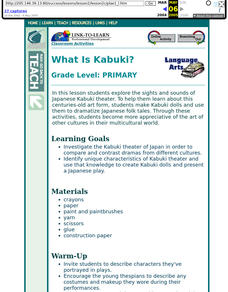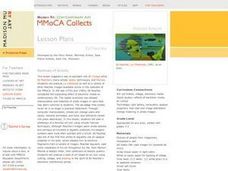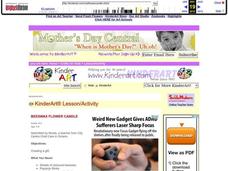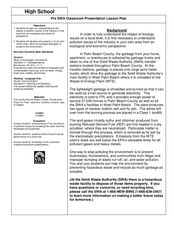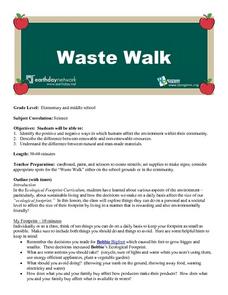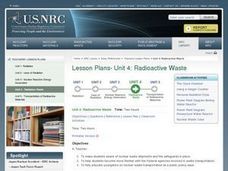Curated OER
NECESSARY WRAPPERS?
Learners bring in a packaged item to unwrap. They weigh the pile of packaging and pile of product and determine which weighs more. They identify the source of raw materials for packaging and discuss ways to reduce packaging and overall...
Curated OER
It's a Wrap!
Learners study two-dimensional and three-dimensional objects by assembling a sculptural piece from something very flat - pieces of newspaper or wallpaper. They see what materials people used to make clothing during the depression.
Curated OER
It's A Gas
Young scholars build an organic waste methane generator and learn by running a scientific experiment to see what happens when people alter nature's way of recycling.
Curated OER
Pollution Prevention At Ft. Riley
Student examine methods of pollution reduction used at Ft. Riley military institution. Pupils review the economic impact of the use of enviromentally sensitive materials.
Curated OER
Solid Waste Management
Sixth graders examine the role of packaging of everyday products and urge manufacturers to reduce the amount of it. They also discover how many products they use everyday can be recycled.
Curated OER
The Rotten Truth
Learners study the process of decomposition using lunch leftovers and soil. They complete the inquiry over set periods time as they observe the how composting takes place and finally, they sort the materials into biodegradable,...
Curated OER
Classroom Conservation
Fourth graders suggest ways paper and other natural resources can be used and recycled in the classroom. Students conduct a investigation into paper use and make distinctions among observations, conclusions (inferences), and predictions.
Curated OER
Ed Paschke
Students examine and discuss the artistic style and techniques of the artist Ed Paschke. They analyze various works of art by Ed Paschke, then choose an icon from art history and alter a photocopy of it using scissors and collage materials.
Curated OER
Listening to the Prairie
Students, in groups, visit an exhibit and for a prairie scavenger hunt to locate sunflowers and name products made from them. After sketching a prairie dog, they find nature cues farmers use when growing plants and raising animals. The...
Curated OER
Beeswax Flower Candle
Students create "Beeswax flower candles" in this early-elementary classroom Art lesson. Materials needed include foam pieces, straw, a glue gun, clay pots, beeswax, and popsicle sticks. This activity is ideal for the students to create...
Curated OER
Make a Spaceship
Pupils create a spaceship, satellite, or space station. In this space lesson, students consider design elements for buildings and objects in space. Pupils use K'Nex, Legos, or other household materials for their creation. Students draw a...
Curated OER
All Hats for Ecology: Solid Waste Presentation
High schoolers investigate community issues with solid waste. In this mock trial lesson, students examine the issues of solid waste from an ecological and economical perspective. They will develop a mock trial which encourages...
Curated OER
Compost Tag
Students identify biodegradable items. In this environmental instructional activity, students participate in a game of tag. A student's name is called out along with a biodegradable item and the student is tossed a ball.
Curated OER
Paper Capers
Students demonstrate how much paper is thrown away in their classroom in one week. They estimate the weight of paper used, weigh the paper at the end of five days, and discuss how students can use less paper.
Curated OER
Environment: Waste Walk
Students assess the positive and negative affects of humans on the environment. The lesson explores ways in which individuals and societies can reduce the negative impact on the environment. By taking a "waste walk" around their campus,...
Curated OER
Radioactive Waste
Students assemble a nuclear waste cube to represent the amount of waste from one person over a period of 20 years that would be left after all stable materials had been recycled. They discuss current methods of containing waste.
Curated OER
Composting
In this recognizing items that can be composted worksheet, students identify organic items that can be composted, write items that can be composted for each of the letters in the word compost, and make a list of vegetables and fruits....
Curated OER
Quilt Block Collage
Learn the art of quilting with this lesson plan that can be connected to a history lesson on quilts in Ancient Egypt, China, and modern art. After studying a general history of quilts, its uses, and the history of different patterns,...
Curated OER
Constructions and Creations: Sturdy Structures
Have your class draw the plans and design a structure. Learners discuss and investigate the variables in the stability of a 2D and 3D model. They also consider how to add a circuit to the design. Afterwards, they present their work.
Chicago Botanic Garden
Introducing Ecosystem Services
Purifying air and water, providing soil in which to grow crops, and moving water through its natural cycle are all services an ecosystem provides that benefit humans. Lesson four in a series lets learners explore and discuss the value of...
Science Friday
Wind Power
Blow away the competition with a lesson about wind power and turbines. Groups build windmills to test how the size of blades affect the amount of work done. The scholars build a variety of blades and collect data on how each type...
Chicago Botanic Garden
Are You Bigfoot?
Scholars independently explore several websites to calculate their ecological footprint. Using their new found knowledge, they answer six short-answer questions and take part in a grand conversation with their peers about how...
Chicago Botanic Garden
Calculating Your Carbon Footprint
Unplugging from technology for one day per week will decrease your carbon footprint—are you up to the challenge? Part two in a series of three allows individuals to explore their personal carbon footprints. By first taking a quiz at home...
Chicago Botanic Garden
Personal Choices and the Planet
How big is your footprint? Activity three culminates the series by having groups complete carbon footprint audits with people in their schools and/or around the districts. Groups then gather their data, create a presentation including...








